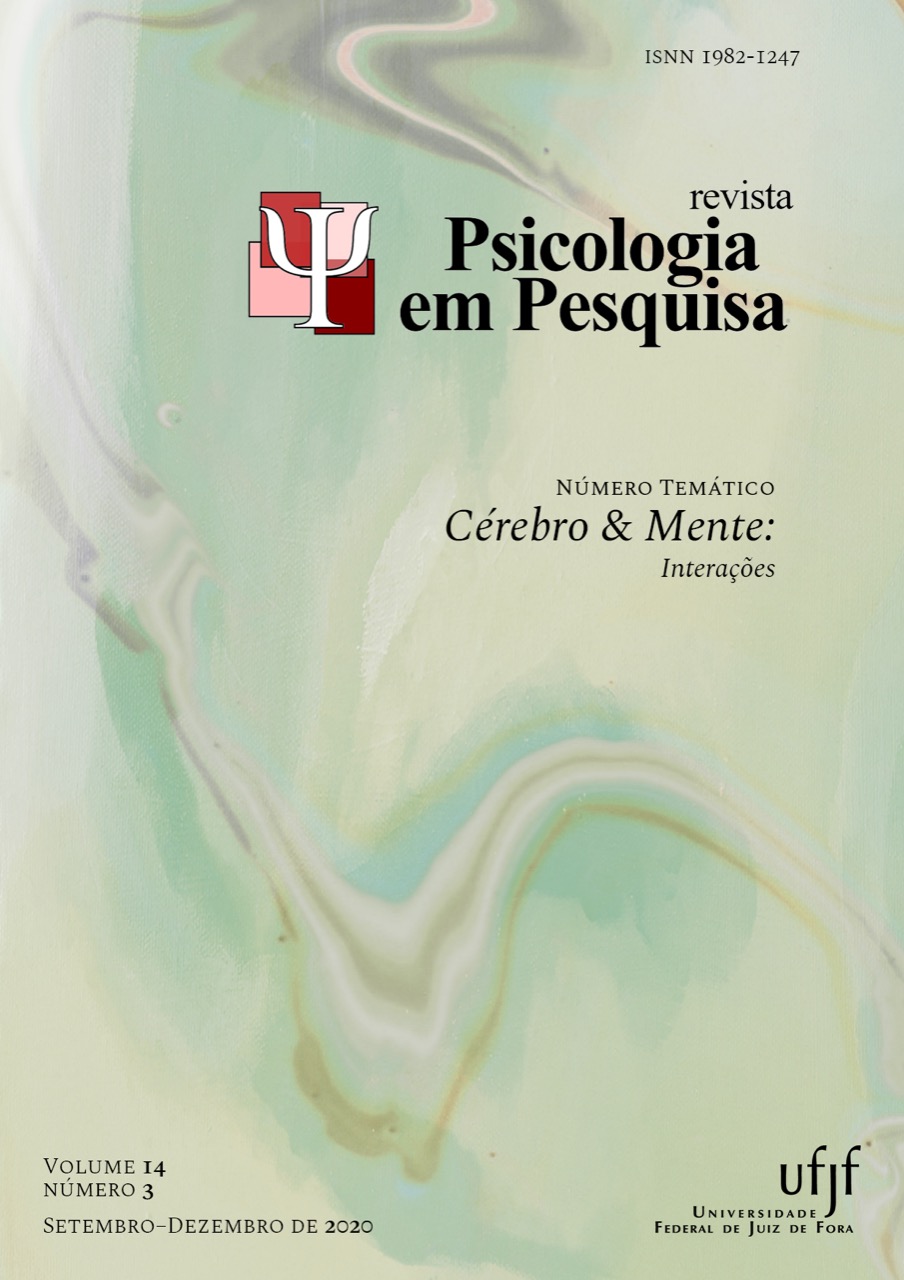La relación del fading affect bias con el humor y la memoria episódica
DOI:
https://doi.org/10.34019/1982-1247.2020.v14.30616Palabras clave:
Fading Affect Bias, La memoria episódica, La memoria autobiográfica, Depresíon, EmocionesResumen
El fading affect bias (FAB) actúa sobre la memoria autobiográfica humana favoreciendo el mantenimiento de las emociones positivas sobre las negativas. Este trabajo cuestionó si este mecanismo podría estar influenciado por la depresión y si se encontraría en la memoria episódica. 55 voluntarios registraron eventos autobiográficos positivos y negativos durante una semana, completaron el Inventario de depresión de Beck y se sometieron a una prueba de memoria con connotaciones positivas, negativas y neutrales. Los resultados sugirieron que el estado de ánimo deprimido puede interferir con el funcionamiento del FAB y afectar el mantenimiento de las emociones positivas en la memoria. Los efectos sobre la memoria episódica fueron menos concluyentes.
Descargas
Citas
Conway, M. A., & Pleydell-Pearce, C. W. (2000). The construction of autobiographical memories in the self-memory system. Psychological Review, 107, 261–288. http://dx.doi.org/10.1037/0033-295X.107.2.261
Dalgleish, T., Williams, J.M.G., Golden, A.M., Perkins, N., Barrett, L.F., Barnard, P.J., Yeung, C.A., Murphy, V., Elward, R., Tchanturia, K. & Watkins, E. (2007). Reduced Specificity of Autobiographical Memory and Depression: The Role of Executive Control. Journal of Experimental Psychology: General, 136(1), 23–42. doi:10.1037/0096-3445.136.1.23
Dutra, T.G., Kurtinaitis, L.C.L. da, Cantilino, A., Vasconcelos, M.C.S. de, Hazin, I. & Sougey, E.B. (2012). A supergeneralização da memória autobiográfica nos transtornos depressivos. Trends in Psychiatry and Psychotherapy, 34(2), 73–79. doi:10.1590/S2237-60892012000200005
Gandini, R.C. de, Martins, M.C.F. do, Ribeiro, M.P. de & Santos, D.T.G. (2007). Inventário de Depressão de Beck – BDI: validação fatorial para mulheres com câncer. Psico –USF, 12(1), 23–31. doi:10.1590/S1413-82712007000100004
Hitchcock, C., Newby, J., Timm, E., Howard, R. M., Golden, A.-M., Kuyken, W., & Dalgleish, T. (2020). Memory category fluency, memory specificity, and the fading affect bias for positive and negative autobiographical events: Performance on a good day–bad day task in healthy and depressed individuals. Journal of Experimental Psychology: General, 149(1), 198-206. http://dx.doi.org/10.1037/xge0000617
Holmes, D.S. (1970). Differential Change in Affective Intensity and the Forgetting of Unpleasant Personal Experiences. Journal of Personality and Social Psychology, 15(3), 234–239. doi:10.1037/h0029394
Joormann, J. & Siemer, M. (2004). Memory Accessibility, Mood Regulation, and Dysphoria: Difficulties in Repairing Sad Mood With Happy Memories? Journal of Abnormal Psychology, 113(2), 179–188. doi:10.1037/0021-843X.113.2.179
Justi, F. R. R., & Justi, C. N. G. (2008). As estatísticas de vizinhança ortográfica das palavras do português e do inglês são diferentes? Psicologia em Pesquisa, 2, 61–73. Recuperado de http://www.ufjf.br/psicologiaempesquisa/files/2009/11/v2n2006.pdf
Kristensen, C. H., Gomes, C. F. A., Justo, A. R., & Vieira, K. (2011). Normas brasileiras para o Affective Norms for English Words. Trends in Psychiatry and Psychotherapy, 33, 135– 146.
Macmillan, N., & Creelman, C. (1991). Detection theory: a user’s guide. Cambridge: Cambridge University Press.
Marsh C, Hammond MD, Crawford MT (2019) Thinking about negative life events as a mediator between depression and fading affect bias. PLoS ONE 14(1): e0211147. https://doi.org/10.1371/journal.pone.0211147
Nandrino, J.L., Pezard, L., Posté, A., Réveillère, C. & Beaune, D. (2002). Autobiographical Memory in Major Depression: A Comparison between First-Episode and Recurrent Patients. Psychopathology, 35, 335–340. doi:10.1159/000068591
Oliveira, G. N. M., Filho, G. M. A., Kummer, A., Salgado, J. V., Portela, E. J., Sousa-Pereira, S. R., & Teixeira, A. L. (2011). Inventário de Depressão de Beck (BDI) e Escala de Avaliação de Depressão de Hamilton (HAM-D) em pacientes com epilepsia. Jornal Brasileiro de Psiquiatria, 60 (2), 131-134.
Ritchie, T.D., Batteson, T.J., Bohn, A., Crawford. M.T., Ferguson G.V., Schrauf, R.W., Vogl, R.J. & Walker, W.R. (2014). A pancultural perspective on the fading affect bias in autobiographical memory. Memory, 23(2), 278–290. doi:10.1080/09658211.2014.884138
Ritchie, T.D. & Skowronski, J.J. (2008). Perceived Change in the Affect Associated With Dreams: The Fading Affect Bias and Its Moderators. Dreaming, 18(1), 27–43. doi:10.1037/1053-0797.18.1.27
Snodgrass, J. G., & Corwin, J. (1988). Pragmatics of measuring recognition memory: applications to dementia and amnesia. Journal of Experimental Psychology: General, 117, 34-50.
Söderlund, H., Moscovitch, M., Kumar, N., Daskalakis, Z.J., Flint, A., Herrmann, N. & Levine, B. (2014). Autobiographical Episodic Memory in Major Depressive Disorder. Journal of Abnormal Psychology, 123(1), 51–60. doi:10.1037/a0035610
Stanislaw, H., & Todorov, N. (1999). Calculation of signal detection theory measures. Behavior Research Methods, Instruments, & Computers, 31, 137-149.
Tulving E. (1983). Elements of Episodic Memory. New York: Oxford University Press.
Walker, W.R., Skowronski, J.J. & Thompson, C.P. (2003). Life Is Pleasant—and Memory Helps to Keep It That Way! Review of General Psychology, 7(2), 203–210. doi:10.1037/1089-2680.7.2.203
Walker, W.R., Skowronski, J.J., Gibbons, J.A., Vogl, R.J. & Thompson, C.P. (2003). On the emotions that accompany autobiographical memories: Dysphoria disrupts the fading affect bias. Cognition and Emotion, 17(5), 703–723. doi:10.1080/02699930244000129
Walker, W.R. & Skowronski. (2009). The Fading Affect Bias: But What the Hell Is It For? Applied Cognitive Psychology, 23, 1122–1136. doi:10.1002/acp.1614
Walker, W.R., Vogl, R.J. & Thompson, C.P. (1997). Autobiographical Memory: Unpleasantness Fades Faster Than Pleasantness Over Time. Applied Cognitive Psychology, 11, 399–413.















